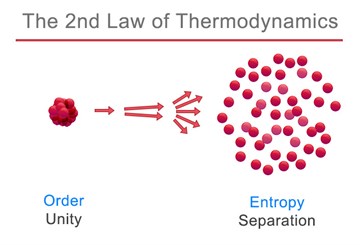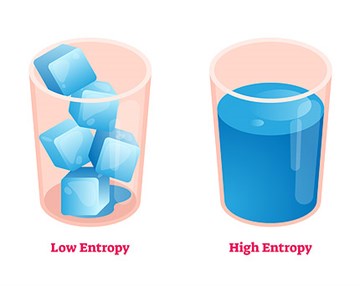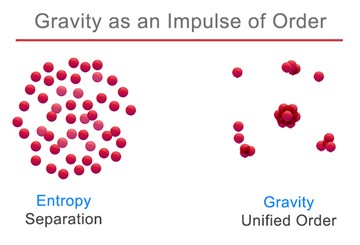Gravity and Biological Order Versus Entropy
Examining the Source of Order
The Laws of Thermodynamics
 In cosmology and physics, there is a well established set of laws that describe the core nature of matter and energy through time. They are known as the "Laws of Thermodynamics". The First Law is: Energy cannot be created or destroyed - only transferred to another form. This is perhaps the most well known law of thermodynamics. Taken with Einstein's most famous equation, E=mcc, it provides the basis for our understanding of the relationship between energy and matter, and the science of nuclear physics.
In cosmology and physics, there is a well established set of laws that describe the core nature of matter and energy through time. They are known as the "Laws of Thermodynamics". The First Law is: Energy cannot be created or destroyed - only transferred to another form. This is perhaps the most well known law of thermodynamics. Taken with Einstein's most famous equation, E=mcc, it provides the basis for our understanding of the relationship between energy and matter, and the science of nuclear physics.
The remaining laws of thermodynamics are primarily focused on the topic of Entropy, and the general tendencies of matter and energy as they progress through time. The second law of thermodynamics states that entropy generally increases over time. Entropy, in a nutshell, is the tendency for energy or matter to become more distributed as time progresses. Free energy,
or concentrated packets of energy/matter tend to disperse and progress to thermal equilibrium.
Taken from another perspective, some might say entropy describes the very "arrow of time".
 If you imagine a cup full of water, and you drop a cube of sugar into it, that cube will dissipate and spread out into the cup of water, given enough time. That's the general gist of what entropy is - Systems of high order dissipate into low order as they come into equilibrium with their environment. You will not ever take a cup of sugar water, and then come back an hour later and find a solid sugar block sitting in your cup of water. There are various other examples that illustrate entropy in action, including ice cubes stabilizing with room temperature into dissipated water, heat dissipating and equalizing with environmental systems, and even in the core concept of randomness.
If you imagine a cup full of water, and you drop a cube of sugar into it, that cube will dissipate and spread out into the cup of water, given enough time. That's the general gist of what entropy is - Systems of high order dissipate into low order as they come into equilibrium with their environment. You will not ever take a cup of sugar water, and then come back an hour later and find a solid sugar block sitting in your cup of water. There are various other examples that illustrate entropy in action, including ice cubes stabilizing with room temperature into dissipated water, heat dissipating and equalizing with environmental systems, and even in the core concept of randomness.
Entropy is a central topic in physics and cosmology, as it describes how matter and energy progress through time. Going back to the Big Bang, the entire history of the universe can be described in terms of coming from a singularity/unity, and, following the laws of thermodynamics, entropically spreading out and becoming more disordered over time, as all that matter and energy that was contained before becomes spread out through time. Entropy is also core to our confirmed observations that the universe is ever expanding. Dark energy seems to be an entropic force that is ever pushing matter apart.
This entropic principle of thermodynamics is tightly interweaved with the progression of time, in all aspects of the universe, down to our everyday lives. However, the second law of thermodynamics doesn't state that entropy always increases. Indeed, there are factors and situations in which entropy decreases, and order increases. This topic of entropy decreasing and order increasing is at the cutting edge of physics and biology debates.
Gravity Versus Entropy
 Firstly, the core force of gravity is one of the most interesting topics of debate. Gravity is well defined in terms of how it works, and what it is, in relation to the three dimensions of matter and fourth dimension of time. We know that gravity bends spacetime, and we know how to calculate, with incredible accuracy, the movement of planets, and the motions of projectiles. But - We don't have any explanation of WHY gravity exists.
Firstly, the core force of gravity is one of the most interesting topics of debate. Gravity is well defined in terms of how it works, and what it is, in relation to the three dimensions of matter and fourth dimension of time. We know that gravity bends spacetime, and we know how to calculate, with incredible accuracy, the movement of planets, and the motions of projectiles. But - We don't have any explanation of WHY gravity exists.
Gravity is the greatest source of order in the universe - instead of continuing out forever from the Big Bang, and becoming more disordered, and more entropic, gravity is the force that counterbalances this general entropic movement through time. Gravity pulls matter together and organizes it, into nebulas, then stars and planets. Gravity is the great unifier on a cosmic scale. But why does it exist? - fighting against the well established laws of thermodynamics. In the Consciocentric Paradigm, consciousness is intrinsic to matter itself, and the fundamental impulses of consciousness are balancing separation versus unity. Consciousness is the driving force behind these core forces and laws. Separation versus unity is the most fundamental balancing act of the universe.
Life Creates Order, Battles Entropy
 Beyond gravity, there are further sources of order that fight the natural laws of thermodynamics. Biological life creates order, where there would otherwise be entropy. Of course, we know this intrinsically and take it for granted. We take rocks and form them into bricks. We mine quarries and forge iron. We create order constantly. In our everyday lives, we are constantly creating order as we build our societies.
Beyond gravity, there are further sources of order that fight the natural laws of thermodynamics. Biological life creates order, where there would otherwise be entropy. Of course, we know this intrinsically and take it for granted. We take rocks and form them into bricks. We mine quarries and forge iron. We create order constantly. In our everyday lives, we are constantly creating order as we build our societies.
There is this gap of knowledge between the gravitational force that fights entropy, and our advanced human lifeforms which create order. The million dollar question is how does life form in the first place? In a world which strictly follows the laws of thermodynamics, this would not happen, however the strong nuclear force and electromagnetic force are purpose built to allow more complex elements to form. These elements then combine, using electromagnetism, into complex molecules. These molecules then combine strategically to create proteins and RNA - the building blocks of life. Single cell organisms organize together, against the natural disorder of entropy. Once single cells are stable, they divide and procreate, creating more copies and them forming organized organisms. The organisms combine and specialize tasks to create more advanced life forms. This whole process of the creation of life is at odds with the natural laws of thermodynamics, and overarching trend of entropy increasing over time. How is it possible that this order is created? And more importantly why -- what is the driver of order?
Dissipative Adaptation, Assembly Theory - The Forefront of Physics, Chemistry and Biology
At the forefront of modern physics, chemistry and biology debates is the topic of Dissipative Adaptation. Dissipative Adaptation describes the mechanics for how, at the quantum / atomic level, matter is able to seemingly disobey the general directives of thermodynamics -- and can organize itself to utilize available energy sources and create more advanced, ordered material systems. Life takes available sunlight, geothermal energy, food, and other available sources of energy, and builds ordered molecular systems which resonant with, and act as receptors or consumers of the available energy.
This topic of Dissipative Adaptation may formalize our understanding of how life is created. But, like Gravity, the bigger question of WHY Dissipative Adaptation occurs is the million dollar question. Once again, from the ConscioCentric Paradigm, with consciousness being fundamental to matter itself, it is the driver of these motions. Consciousness is the fundamental force under all the others, and its primary focus is moving between separation and unity, balancing entropy with order, and in the process, CREATING molecular structures and lifeforms which give more control over the 3D material environment, with more agility in 4D time. This is the game of life... the game of consciousness.
https://www.quantamagazine.org/a-new-thermodynamics-theory-of-the-origin-of-life-20140122/
 Steven HawkingTheoretical Physicist, Cosmologist and Author
Steven HawkingTheoretical Physicist, Cosmologist and Author "Because there is a law such as gravity, the Universe can and will create itself from nothing."
 Steven HawkingTheoretical Physicist, Cosmologist and Author
Steven HawkingTheoretical Physicist, Cosmologist and Author "If the rate of expansion one second after the Big Bang had been smaller by even one part in a hundred thousand million million, it would have recollapsed before it reached its present size. On the other hand, if it had been greater by a part in a million, the universe would have expanded too rapidly for stars and planets to form."
 Werner HeisenbergPhysicist, Quantum Mechanics Pioneer, Nobel Prize
Werner HeisenbergPhysicist, Quantum Mechanics Pioneer, Nobel Prize "The same organizing forces that have shaped nature in all her forms are also responsible for the structure of our minds."
 Stuart HameroffAnesthesiologist and Consciousness Philosopher
Stuart HameroffAnesthesiologist and Consciousness Philosopher "Consciousness is the music of the Universe."
 Jeremy EnglandPhysicist, Professor
Jeremy EnglandPhysicist, Professor "You start with a random clump of atoms, and if you shine light on it for long enough, it should not be so surprising that you get a plant."
 Jeremy EnglandPhysicist, Professor
Jeremy EnglandPhysicist, Professor "I am certainly not saying that Darwinian ideas are wrong, on the contrary, I am just saying that from the perspective of the physics, you might call Darwinian evolution a special case of a more general phenomenon."
 Sean CarrollPhysicist, Philosopher
Sean CarrollPhysicist, Philosopher "The interaction of gravity with other forces seems to be able to create order while still making the entropy go up—temporarily, anyway. That is a deep clue to something important about how the universe works; sadly, we aren’t yet sure what that clue is telling us."
 Sean CarrollPhysicist, Philosopher
Sean CarrollPhysicist, Philosopher "The universe is incredibly more orderly than it has any right to be."